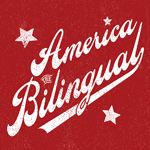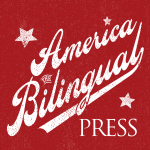NEW FROM
“A MUST-READ FOR WORD LOVERS AND LANGUAGE LEARNERS”
“Mim Harrison gives us a delightfully erudite romp through the English language, celebrating its riotous, border-crossing history with wit, warmth and a lexicographer’s love of nuance. Revealing the hidden stories behind everyday words, she shows how this magpie of languages has borrowed, blended and blundered its way into the rich patchwork we speak today.”
—ROSS KING, New York Times bestselling author of Brunelleschi’s Dome and The Bookseller of Florence
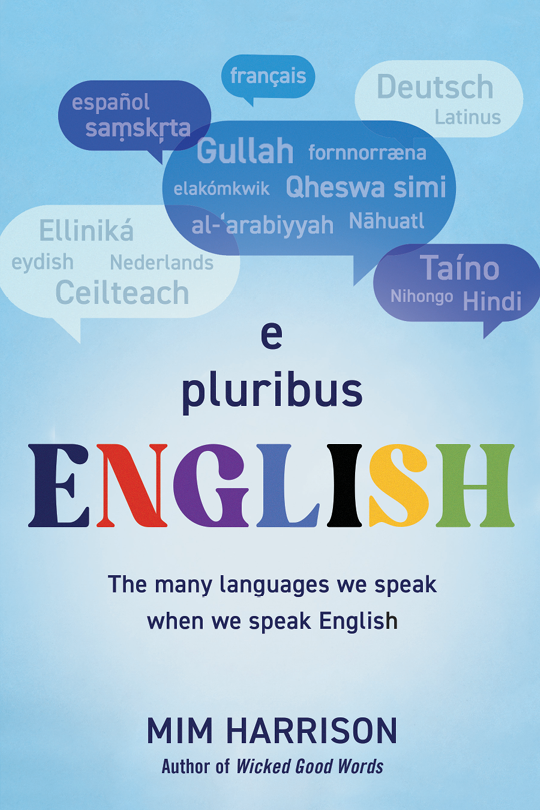
Learning a new language comes with an unexpected bonus: Discovering more about the language you already speak. And when that language is English, you’re in luck!
Good for you, learning a new language!
Here are three ideas to keep in mind about the language you already speak that can help you on your journey.

Think of all the languages you speak when you speak English
English is, to simplify, a language of other languages. To varying degrees, English is: Celtic, Germanic, Scandinavian, Latin, French, Greek, Arabic, Hindi, Dutch, and Spanish. In America, add influences of African and Indigenous languages as well, together with Yiddish.
So, given how many other languages come spilling out of our mouths every day, if ever there were a gateway to enjoying other languages, ours is surely it.

Let’s just say phooey to the word foreign
“Foreign” stems from the Latin foris, for outside. The Online Etymology Dictionary also sees a connection between foreign and forest, a place that can be downright scary if you get lost in it. Just ask Hansel and Gretel. And notice how close the Italian word for “foreigner” is: forestiero.
With a language that has as many words as English does, surely we can come up with one less fraught and unfriendly than “foreign.” Only the Veterans of Foreign Wars should lay claim to it.
After all, the sofa you sit on is from Arabic; the courtesy you extend someone is French; the panic you might feel is Greek. Not so foreign after all.
When we view our language from this vantage point, we might come to feel more at home with other languages, especially those that are not total strangers to our tongue.
Which segues to our next idea…

There’s no such thing as a foreign language, just a language we don’t know
Thanks to its history, English is a language capable of sparking great curiosity in other languages.
That’s why exploring the many languages we speak when we speak English matters. Even if we won’t know all or even most of another language, we can try to acquire enough of it so that it becomes something familiar and fun, rather than formidable and forbidding.
Did we say three ideas? Let’s add one more:

The secret weapon that word lovers possess
In a word: etymology, and the final chapter of E Pluribus English explores how wanting to know about word origins can help language learners. (Teaser: after reading that final chapter, you’ll be able to say the word for “lighthouse” in six different languages in no time—and the words sound nothing like “lighthouse.”)

Library of Congress
So…do these four ideas constitute some magic-wand formula for learning another language just like that, and with zero pain? Of course not. But they do help us approach a new language with added perspective and an extra dollop of confidence.
“Mim Harrison takes us on a wonderful journey across time and place that enlightens us about the story of English with charm, wit, and perspective. I read her book with so many aha and laugh-aloud moments, and applaud her ultimate message to relish English and be open to where it can take us.” —Lorie Roule, Senior Executive at Transparent Language, Inc.
So many words, so many stories
In every language we’ll find words that have interesting stories. Because English is a language made up of other languages, we have more than our share of them. Here are three of the more than 450 you’ll find in E Pluribus English:
1. From Arabic: bone setting with algebra
“Bone setting” was a meaning that English speakers ascribed to algebra in the 15th century. In an odd sort of way, they were close. Al jabr (or al jebr) indicated a “reunion of broken parts.” More broadly, it meant “the reunification.” And so, write the math lovers on the Story of Mathematics site, “we can say algebra helps us to reunite bits of information.”
2. From Greek: cosmic milk in the galaxy
Just how does the English word galaxy derive from the Greek word (gala) for “milk”? Thank Hera, the goddess of childbirth. She missed the mark breastfeeding and created that distinctive grouping of bright stars we call the Milky Way. You can’t make this stuff up. Unless, of course, you’re an ancient Greek.
3. From the Algonquian: what’s a raccoon?
A raccoon was one of several four-legged creatures that perplexed European arrivals to America. They didn’t have the creatures in Europe, so they didn’t have the names for them. The Algonquian arakuhn became “raccoon.” Similar name borrowings took place for chipmunk, muskrat, moose, possum, and skunk.
Some of the many languages we speak when we speak English are on the cover of E Pluribus English
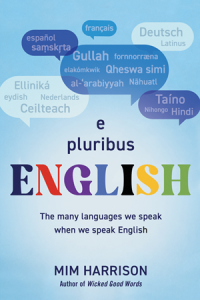
“DELIGHTS AWAIT ON EVERY PAGE”
“This book is such a fun and fantastic romp through the histories and hidden stories of both ordinary and odd words of English. Delights await on every page. Get it for your own enjoyment, and give it to your friends. They will love it and you for bringing it to them.”
—Tom Morris, PhD, bestselling author of such books as True Success, If Aristotle Ran General Motors, The Oasis Within, and Philosophy for Dummies
A FEW WORDS FROM THE AUTHOR
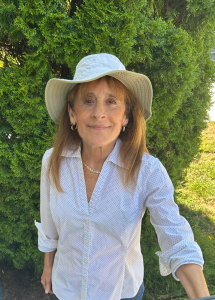 “English is a language made up of many other languages, and therein lies its magic,” says Mim Harrison. As part of the America the Bilingual team, she is learning Spanish and finds being a word nerd who loves origin stories a plus.
“English is a language made up of many other languages, and therein lies its magic,” says Mim Harrison. As part of the America the Bilingual team, she is learning Spanish and finds being a word nerd who loves origin stories a plus.
“I still remember the delight when I discovered it was no coincidence that the Spanish ojalá sounded uncannily like the Arabic inshalla. And the two have a comparable meaning of ‘hopefully,’” she says. “I credit English for this discovery because it’s a language that sparks great curiosity in other languages, having so many of them itself.
“I hope that this book will help you discover your own delights with the language you’re learning, and that you’ll enjoy the stories behind the many English words that I share with you.”
E Pluribus English is Mim’s fourth book on the English language.
“A WORD PLAYGROUND!”
“It was a red-letter day (page 97) when I read this joyful, very well-researched work of language art.”
—Andrea Syverson, author of Alter Girl, BrandAbout, and ThinkAbout
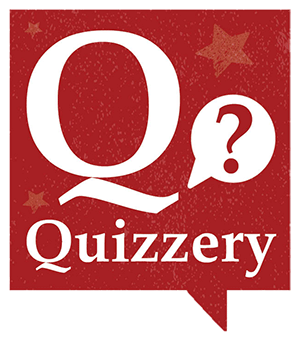
A quiz to pique your curiosity
Head on over to America the Bilingual’s Quizzery, and test your knowledge of words from some of the many languages in the English language. The quiz features 12 words from languages profiled in E Pluribus English whose origins may (or may not!) surprise you.
